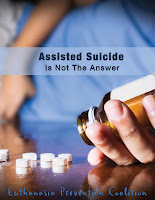Executive Director, Euthanasia Prevention Coalition
In January 2019 I commented on an article by the CEO of Compassion & Choices, (formerly known as the Hemlock society) who stated that assisted suicide laws need fewer regulations. Kim Callinan wrote:
If lawmakers want to improve medical aid in dying laws, then let’s address the real problem: There are too many regulatory roadblocks already! I am not suggesting changing the eligibility requirements, as our opposition will suggest. I am merely suggesting that we drop some of the regulations that put unnecessary roadblocks in place.
This legislative direction resulted in several state assisted suicide bills including language to: define assisted suicide as palliative care, deny conscience rights to healthcare professionals, define assisted suicide in language that permits euthanasia and to eliminate waiting periods before dying by assisted suicide.
Last year the Oregon legislature also expanded their assisted suicide law by waiving the 15 day waiting period.
The Washington State legislature is now debating a "study bill" to examine the elimination of "safeguards" in assisted suicide laws. Bill 2419 states:
(1) The University of Washington shall conduct a study of the ability of Washington residents to make use of the rights established under this chapter.
The study shall review the extent to which there are barriers to achieving full access to the Washington death with dignity act, including:
(a) A lack of awareness of the Washington death with dignity act and its provisions;
(b) Burdens for qualified patients to meet the fifteen-day waiting period;
(c) Concerns that inhibit the participation of health care providers in the provisions of this chapter;
(d) Hospital, medical, hospice, and long-term care providers' policies that restrict the participation in and the distribution of information about the provisions of this chapter;
(e) Limited geographic access to compounding pharmacies or other pharmacies that dispense medications under this chapter;
(f) Restrictions based on the requirement that the medications under this chapter be self-administered;
(g) Lack of insurance coverage for the services and medications necessary to participate in the provisions of this chapter;
(h) The need for improvements to the data collection system; and
(i) Any other barriers identified in the course of performing the study.
Section f questions the need to self-administer lethal drugs. If lethal drugs do not need to be self-administered then someone else can administer. Can you say euthanasia / homicide.
The assisted suicide lobby would not ask their friends at the University of Washington to do this study if they didn't want to expand access to assisted suicide.
There are several states debating the legalization of assisted suicide in 2020. These state legislatures need to ask if they support assisted suicide for people who are not terminally ill, who may be incompetent or mentally ill, because that is what Canada is debating. These state legislatures also need to ask if they support doctors lethally injecting their patients (euthanasia) because that is what the imprecise language in some of the assisted suicide bills permit and clearly that is what the assisted suicide lobby wants next.
Canada legalized euthanasia in June 2016. The government just completed a misleading euthanasia consultation and it now plans to introduce a new expansive euthanasia law within days.
Canada legalized euthanasia in June 2016. The government just completed a misleading euthanasia consultation and it now plans to introduce a new expansive euthanasia law within days.


No comments:
Post a Comment